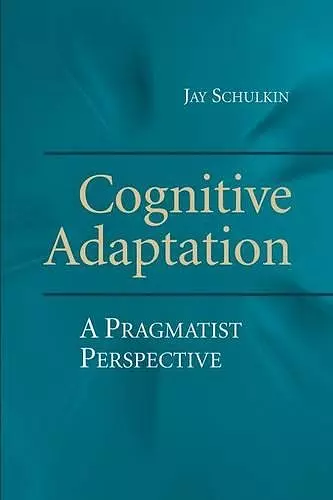Cognitive Adaptation
A Pragmatist Perspective
Format:Paperback
Publisher:Cambridge University Press
Published:6th Nov '14
Currently unavailable, and unfortunately no date known when it will be back
This paperback is available in another edition too:
- Hardback£100.00(9780521517911)

Argues that there is a fundamental, evolutionary link between cognitive systems and evolution that underlies human activity.
Schulkin argues that there is a fundamental link between cognitive/neural systems and evolution that underlies human activity. He further argues for a regulative norm of self-corrective inquiry, an appreciation of the hypothetical nature of all knowledge. Schulkin's perspective is rooted in contemporary behavioral and cognitive neuroscience.Cognitive Adaptation: A Pragmatist Perspective argues that there is a fundamental link between cognitive/neural systems and evolution that underlies human activity. One important result is that the line between nature and culture and scientific and humanistic inquiry is quite permeable - the two are fairly continuous with each other. Two concepts figure importantly in our human ascent: agency and animacy. The first is the recognition of another person as having beliefs, desires, and a sense of experience. The second term is the recognition of an object as alive, a piece of biology. Both reflect a predilection in our cognitive architecture that is fundamental to an evolving, but fragile, sense of humanity. The book further argues for a regulative norm of self-corrective inquiry, an appreciation of the hypothetical nature of all knowledge. Schulkin's perspective is rooted in contemporary behavioral and cognitive neuroscience.
“Professor Jay Schulkin is in a rare class of writers, as at home in the fields of philosophy of mind and cognitive science as he is in the fields of neuroimaging and neuroscience. Here he has produced a wide ranging book that reveals his endless appetite for asking deep and searching questions about the evolution of the mind, and that will stimulate the reader to want to read more about how the mind works.” —Simon Baron-Cohen, Director, Autism Research Centre, Cambridge University
“Cognitive Adaptation represents the culmination of Jay Schulkin’s exploration of the origins of human mind, thought, and language from our ongoing embodied engagement with our physical environments, our coordinated social interactions, and our emerging capacities for symbolic communication. Schulkin is one of a handful of philosophically sophisticated experts in physiology and neuroscience who are able to sketch the broader picture of human nature, human meaning, and human thought entailed by his naturalistic, embodied view of the person. Drawing on his vast interdisciplinary knowledge of fields such as neuroscience, psychology, anthropology, philosophy, and theology, Schulkin provides a rich and compelling pragmatist view of knowledge, social interaction, values, education, and spirituality. The result is a scientifically well-informed yet humane and inspiring vision of human life.” —Mark Johnson, Knight Professor of Liberal Arts and Sciences, Department of Philosophy, University of Oregon
“Perhaps the most pressing long-term challenge for cognitive neuroscience is the development of a theory that addresses the mid-level between neural systems and consciousness and that explicates their relationship. Jay Schulkin is one of a few people who has both the biological and philosophical background to take on this challenge. His powerful and provocative theory, which he calls cognitive adaptation, will deeply influence those who follow in this difficult and exciting work.” —Jonathan D. Moreno, David and Lyn Silfen University Professor, University of Pennsylvania
ISBN: 9781107462717
Dimensions: 230mm x 152mm x 10mm
Weight: 300g
210 pages